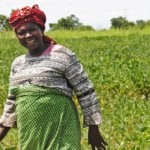On March 8, 2017, the world celebrates International Women’s Day. To understand women’s role in agriculture and to close the gender gap in agricultural production, IFPRI's research has been examining gender differences within rural households and communities for over 25 years.
Women’s Empowerment in Agriculture Index: Bangladesh
WEAI is a first-of-its-kind tool measuring the roles and extent of women’s empowerment in agriculture relative to men within their households, particularly women’s control over critical parts of their lives. It also helps in identifying the women who are disempowered and what areas they are disempowered in, information that is instrumental in designing solutions to close the empowerment gap.
IFPRI and FAO Addressing Gender Inequalities through Agricultural Policies
Traditionally, agricultural development and research tended to ignore gender, which contributed to the marginalization of women and missed opportunities to reduce poverty. Recognizing International Food Policy Research Institute’s (IFPRI) leadership on gender and agriculture, The Food and Agriculture Organization of the United Nations (FAO) called on IFPRI in the late 2000s to collaborate on projects >> Read more
IFPRI and FAO Presenting Evidence-based Analysis of Key Issues in Food and Agriculture
The rich partnership between the Food and Agriculture Organization of the United Nations (FAO) and the International Food Policy Research Institute has been generating cutting-edge technical knowledge and enhanced expertise in support of food security and improved nutrition for all. One of the earliest and long-standing collaborations between FAO and IFPRI is centered on FAO’s >> Read more
Highlights of the IFPRI and FAO Partnership
This brochure presents highlights and successes of the partnership between FAO and IFPRI. For four decades, the rich partnership between FAO and IFPRI has generated cutting-edge technical knowledge and enhanced expertise in support of food security and improved nutrition for all, and for making agriculture and food systems more inclusive, productive, resilient, and sustainable. Driven by >> Read more
WEAI: Making Development Programs Inclusive
Since its launch in 2012, WEAI has been revolutionizing how women’s empowerment and role in agriculture are seen and measured. WEAI also proved to be very valuable to other organizations’ monitoring and evaluation efforts.





